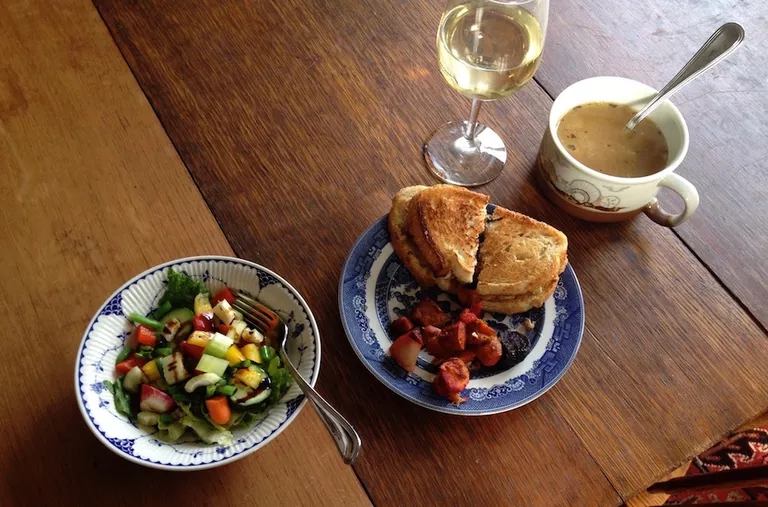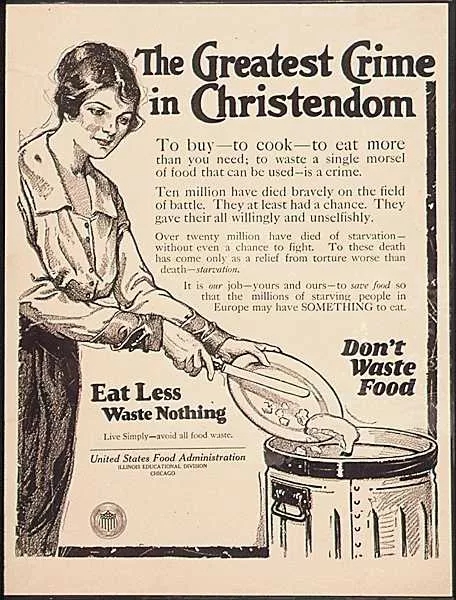我们要学会爱我们的剩饭剩菜
我们要学会爱我们的剩饭剩菜
Who cares if it's monotonous or 'weird'? It's time to fight wasteful food habits.
谁在乎它是单调还是怪异呢?是时候与浪费食物的习惯作斗争了。
Last week I wrote about the new report on food waste published by the Natural Resources Defense Council (NRDC). The report found that 27 million tons of food are thrown away each year in the United States, and that households, surprisingly, are responsible for the greatest proportion of food waste.
上周,我写了一篇由自然资源保护委员会(NRDC)发表的关于食物浪费的新报告。该报告发现,美国每年有2700万吨食物被扔掉,令人惊讶的是,家庭是食物浪费的最大比例。

CC BY 2.0. Dave Miller -- Sometimes the best meals are random assortments of leftover foods.
Nearly a quarter (23%) of that household waste is 'prepared foods and leftovers.' Thirty-five percent is considered 'inedible parts' and 5 percent is oil/grease, but the remaining 37 percent is a mix of produce, baked goods, meat and dairy, snacks, and dry food -- in other words, foods that, ideally, would not go to waste.
将近四分之一(23%)的家庭垃圾是“熟食和剩菜”。35%被认为是“不能食用的部分”,5%是油或油脂,但剩下的37%是农产品、烘焙食品、肉类和奶制品、零食和干粮的混合物——换句话说,理想情况下,是不会被浪费的食物。
In a world where hunger is still a reality for many, and there is concern about how to feed a growing human population, this quantity and source of food waste is very disturbing. As the Washington Post reports, this finding "defies conventional wisdom about the sorts of foods consumers waste — and represents a major obstacle for environmentalists and anti-food-waste campaigns."
在这个世界上,饥饿仍然是许多人的现实问题,人们担心如何养活不断增长的人口,这种食物浪费的数量和来源是非常令人不安的。正如《华盛顿邮报》所报道的,这一发现“颠覆了关于消费者浪费食物种类的传统观念——代表了环保主义者和反浪费食物运动的一个主要障碍。”
Dana Gunders of the NRDC believes there is a cultural aversion to eating leftovers; it's likely a remnant of the psychological shift that occurred in the 1960s with the advent of refrigeration. No longer were people in a hurry to finish off dishes that they knew would keep. The problem has only gotten worse with easier access to prepared foods and their ever-plummeting costs. Food is so cheap and plentiful that nobody worries about where and how they'll get it.
自然资源保护委员会的Dana Gunders认为,人们对吃剩菜有一种文化上的反感;这可能是20世纪60年代冷藏技术出现后出现的心理转变的残余。人们不再急于吃完他们知道会保存下来的菜。随着现成食品的容易获得和成本的不断下降,这个问题只会变得更糟。食物是如此的便宜和丰富,没有人担心在哪里和如何得到它。
Gunders thinks that the stigma associated with eating leftovers needs to be addressed most rapidly, more so than focusing on "improving consumers' food literacy and kitchen skills." This is about getting Americans to accept that eating leftovers is a good idea, that monotonous meals are a part of life, and that it's immoral to throw good food away. (The morality argument was effective during the World War years, when minimizing food waste was a big part of government propaganda campaigns. There's no reason why it couldn't work again.)
Gunders认为,与吃剩菜有关的污名需要尽快得到解决,而不是专注于“提高消费者的食品知识和厨房技能”。这是为了让美国人接受吃剩菜剩饭是个好主意,让单调的饭菜成为生活的一部分,让他们接受扔掉好食物是不道德的。(这种道德观点在第二次世界大战期间非常有效,当时最大限度减少食物浪费是政府宣传活动的一个重要部分。没有理由它不能再次被提起。)

credit: WWI Poster
Gunders makes a good point, but I think cooking skills -- or, lack thereof -- still have much to do with it. Many American home cooks have lost the ability to use up their leftover ingredients. Reheating a meal and eating it all week long is one thing, but knowing how to turn a motley bunch of sad, lone ingredients into dinner takes practice, skill, and a pinch of determination.
Gunders的观点很好,但我认为烹饪技巧——或者缺乏烹饪技巧——仍然与此有很大关系。许多美国家庭厨师已经失去了烹饪吃剩的食材的能力。把一顿饭重新加热,吃上一整个星期是一回事,但知道如何把一堆令人伤心、孤独的配料变成一顿饭,需要练习、技巧和一点点决心。
Fortunately, a number of celebrity chefs are trying to change the image of leftovers and inspire people to embrace them. Take Anthony Bourdain's new documentary film, "Wasted," and Dan Barber's pop-up restaurant in London, WastED, earlier this year that used only waste ingredients and many big names to create high-end feasts. Massimo Bottura is another outspoken advocate for breathing new life into unloved ingredients, saying, "We don’t need to produce more; we need to act different."
幸运的是,一些名厨正在努力改变剩菜的形象,鼓励人们接受它们。以安东尼·波登的新纪录片《浪费》为例,还有丹·巴伯今年早些时候在伦敦开的快跳餐厅《浪费》,这家餐厅只用浪费的食材和许多大牌来打造高端盛宴。马西莫·博图拉是另一位直言不讳的倡导者,主张为不受欢迎的食材注入新生命,他说,“我们不需要生产更多;我们需要采取不同的行动。”
Despite the glamour and star-studded support these days, the essence of using leftovers is, in fact, a return to the humble past. La cucina povera, or peasant cuisine, is where our home-cooked meals need to go in order to incorporate leftover or neglected ingredients. We need to stew, braise, and boil these items to tastiness. By looking to old recipes, and the ways in which our grandmothers cooked (sadly, the grandfathers were usually absent from the kitchen), we will find inspiration for using the stems, leaves, and slightly-off foods that might otherwise get tossed in the trash.
尽管如今有这么多明星的支持和魅力,但使用剩菜剩饭的本质实际上是回归到过去的谦卑。La cucina povera,或称农民烹饪,是我们的家常菜需要用到的地方,以便将剩余的或被忽略的食材加入其中。我们需要把这些东西炖、蒸、煮到味道好。通过寻找旧的食谱,以及我们的祖母烹饪的方式(遗憾的是,祖父通常不在厨房),我们会找到灵感,使用茎、叶和一些可能会被扔进垃圾的食物。
Here's to the food of the poor, which, hopefully soon, will be seen as the food of the wise.
为穷人的食物干杯,希望它很快就会被视为智者的食物。
- 频道推荐
- |
- 全站推荐
- 推荐下载
- 网站推荐


















